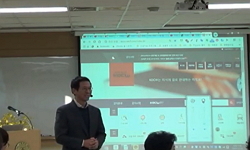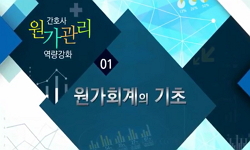본 연구의 목적은 요양병원 간호사를 대상으로 심폐소생술금지(DNR)에 대한 윤리적 태도, DNR 결정 후 간호활동과 중요도 변화를 파악하고, 변수 간의 상관관계를 확인하는 것이다. 궁극적으...
http://chineseinput.net/에서 pinyin(병음)방식으로 중국어를 변환할 수 있습니다.
변환된 중국어를 복사하여 사용하시면 됩니다.
- 中文 을 입력하시려면 zhongwen을 입력하시고 space를누르시면됩니다.
- 北京 을 입력하시려면 beijing을 입력하시고 space를 누르시면 됩니다.
요양병원 간호사의 심폐소생술금지 환자에 대한 윤리적 태도, 간호활동과 중요도 변화 = Ethical Attitude toward Do-Not-Resuscitate(DNR) patient, Changes in Nursing Activities and Importance after DNR Decisions in Long-term Care Hospital Nurses
한글로보기https://www.riss.kr/link?id=T15915452
- 저자
-
발행사항
무안 : 목포대학교 대학원, 2021
-
학위논문사항
학위논문(석사) -- 목포대학교 대학원 , 간호학과 간호학전공 , 2021. 8
-
발행연도
2021
-
작성언어
한국어
- 주제어
-
발행국(도시)
전라남도
-
형태사항
vii, 83 p. ; 26 cm
-
일반주기명
지도교수: 김선경
-
UCI식별코드
I804:46002-000000023148
- 소장기관
-
0
상세조회 -
0
다운로드
부가정보
국문 초록 (Abstract)
자료 수집을 위해 G광역시, J도에 소재한 9개 요양병원에 근무하는 간호사를 대상으로 2019년 10월 31일부터 11월 15일까지 자가보고형 설문조사를 시행하였고, 총 179명의 자료를 최종 분석에 사용하였다. 연구도구는 DNR에 대한 윤리적 태도, DNR 결정 후 간호활동의 변화, DNR 결정 후 간호활동의 중요도 변화를 측정하기 위한 도구를 사용하였다.
수집된 자료는 SPSS 프로그램을 이용하여 실수와 백분율, 평균과 표준편차, Pared t-test, Independent t-test, One way ANOVA 분석 후 Scheffé test, Pearson's correlation coefficients를 분석하였고, 도구의 신뢰도는 Cronbach's α 계수로 분석하였다.
연구결과를 요약하면 다음과 같다.
가. 요양병원 간호사의 DNR 교육경험은 142명(79.3%)이 있었고, 37명 (20.7%)은 없었다. 간호사의 91명(50.8%)이
병원 내에서 교육을 받았으며, 167명(93.3%)은 DNR 교육이 필요하다고 응답하였다.
나. DNR에 대한 윤리적 태도는 4점 만점에서 2.89(±0.28)점이었다. 하위영역별로 DNR 결정 후 의료행위범위 점수가
3.02(±0.37)점으로 가장 높았으며, DNR 결정과정 2.98±(0.62)점, DNR 결정에 대한 태도 2.84(±0.31)점, DNR 상황
시 설명 2.57(±0.63)점 순으로 나타났다. DNR에 대한 윤리적 태도는 근무부서(t=-3.60, p<.001)에 따라 유의한 차
이가 있었다.
다. DNR 결정 후 간호활동의 변화에서 영역별 ‘변화없음’이 가장 많은 영역은 정서적 영역이었고, ‘활동증가’는 사회적 영
역, '활동감소‘는 신체적 영역으로 나타났다. 영역별 DNR 결정 후 간호활동 변화는 가족의 DNR 결정경험유무에 따라
신체적, 정서적 영역에서 유의한 차이가 있었고, DNR 교육경험유무에 따라 정서적, 영적, 사회적 영역에서 유의한 차이
가 있었다.
라. DNR 결정 전, 후 간호활동의 중요도 변화는 신체적 영역과 정서적 영역에서 감소하였고, 영적 영역에서 증가하였다. 영
역별 DNR 결정 후 간호활동의 중요도 변화는 근무부서에 따라 정서적 영역에서 유의한 차이가 있었다.
마. 총 임상경력은 DNR 결정 후 간호활동의 중요도 변화 하위영역 중 영적 영역과 상관관계가 있었으나, 그 외 변수 간에는
유의한 상관관계가 확인되지 않았다.
DNR 환자에 대한 간호활동의 수행과 중요성을 올바르게 인식하고 윤리의식을 강화할 수 있는 교육 계획 및 수립을 위한 간호행정조직의 노력이 필요하다. 교육에 적극적으로 참여하는 긍정적 부서 분위기 조성을 위해 전략 개발이 필요하다. 마지막으로 신체적 영역의 기본간호를 포함한 간호활동은 감소없이 이루어져야하고 정서적, 영적, 사회적 영역은 환자에게 적합한 간호제공으로 바람직한 변화가 필요하다. 또한 표준화된 DNR 환자 간호활동지침서 마련과 교육 프로그램 개발이 요양병원 간호사의 윤리적 갈등을 최소화할 수 있을 것으로 기대한다.
주요어: 요양병원, 간호사, DNR, 윤리적 태도, 간호활동의 변화, 중요도 변화
본 연구의 목적은 요양병원 간호사를 대상으로 심폐소생술금지(DNR)에 대한 윤리적 태도, DNR 결정 후 간호활동과 중요도 변화를 파악하고, 변수 간의 상관관계를 확인하는 것이다. 궁극적으로, 요양병원 내 DNR 관련 현황을 파악하고, DNR 환자 간호활동수행과 중요도의 바람직한 조직문화에 대한 방향성을 제시하며, 간호활동 지침마련과 간호교육에 필요한 기초자료를 제공하고자 시행한 서술적 조사 연구이다.
자료 수집을 위해 G광역시, J도에 소재한 9개 요양병원에 근무하는 간호사를 대상으로 2019년 10월 31일부터 11월 15일까지 자가보고형 설문조사를 시행하였고, 총 179명의 자료를 최종 분석에 사용하였다. 연구도구는 DNR에 대한 윤리적 태도, DNR 결정 후 간호활동의 변화, DNR 결정 후 간호활동의 중요도 변화를 측정하기 위한 도구를 사용하였다.
수집된 자료는 SPSS 프로그램을 이용하여 실수와 백분율, 평균과 표준편차, Pared t-test, Independent t-test, One way ANOVA 분석 후 Scheffé test, Pearson's correlation coefficients를 분석하였고, 도구의 신뢰도는 Cronbach's α 계수로 분석하였다.
연구결과를 요약하면 다음과 같다.
가. 요양병원 간호사의 DNR 교육경험은 142명(79.3%)이 있었고, 37명 (20.7%)은 없었다. 간호사의 91명(50.8%)이
병원 내에서 교육을 받았으며, 167명(93.3%)은 DNR 교육이 필요하다고 응답하였다.
나. DNR에 대한 윤리적 태도는 4점 만점에서 2.89(±0.28)점이었다. 하위영역별로 DNR 결정 후 의료행위범위 점수가
3.02(±0.37)점으로 가장 높았으며, DNR 결정과정 2.98±(0.62)점, DNR 결정에 대한 태도 2.84(±0.31)점, DNR 상황
시 설명 2.57(±0.63)점 순으로 나타났다. DNR에 대한 윤리적 태도는 근무부서(t=-3.60, p<.001)에 따라 유의한 차
이가 있었다.
다. DNR 결정 후 간호활동의 변화에서 영역별 ‘변화없음’이 가장 많은 영역은 정서적 영역이었고, ‘활동증가’는 사회적 영
역, '활동감소‘는 신체적 영역으로 나타났다. 영역별 DNR 결정 후 간호활동 변화는 가족의 DNR 결정경험유무에 따라
신체적, 정서적 영역에서 유의한 차이가 있었고, DNR 교육경험유무에 따라 정서적, 영적, 사회적 영역에서 유의한 차이
가 있었다.
라. DNR 결정 전, 후 간호활동의 중요도 변화는 신체적 영역과 정서적 영역에서 감소하였고, 영적 영역에서 증가하였다. 영
역별 DNR 결정 후 간호활동의 중요도 변화는 근무부서에 따라 정서적 영역에서 유의한 차이가 있었다.
마. 총 임상경력은 DNR 결정 후 간호활동의 중요도 변화 하위영역 중 영적 영역과 상관관계가 있었으나, 그 외 변수 간에는
유의한 상관관계가 확인되지 않았다.
DNR 환자에 대한 간호활동의 수행과 중요성을 올바르게 인식하고 윤리의식을 강화할 수 있는 교육 계획 및 수립을 위한 간호행정조직의 노력이 필요하다. 교육에 적극적으로 참여하는 긍정적 부서 분위기 조성을 위해 전략 개발이 필요하다. 마지막으로 신체적 영역의 기본간호를 포함한 간호활동은 감소없이 이루어져야하고 정서적, 영적, 사회적 영역은 환자에게 적합한 간호제공으로 바람직한 변화가 필요하다. 또한 표준화된 DNR 환자 간호활동지침서 마련과 교육 프로그램 개발이 요양병원 간호사의 윤리적 갈등을 최소화할 수 있을 것으로 기대한다.
주요어: 요양병원, 간호사, DNR, 윤리적 태도, 간호활동의 변화, 중요도 변화
다국어 초록 (Multilingual Abstract)
For data collection, self-reported questionnaires were completed by nurses at nine long-term care hospitals located at J-do in G metropolitan city from Oct. 31 to Nov. 15, 2019. The data of 179 nurses were used in the final analysis. The measurement tools in this study focused on the ethical attitude toward DNR, changes in nursing activities after a DNR decision, and changes in nursing importance after a DNR decision.
The collected data were analyzed using the SPSS program. The frequency, percentage, mean, and standard deviation were calculated for demographic data. Paired t-test, independent t-test, and one-way analysis of variance were performed, followed by the Scheffé test and Pearson’s correlation coefficient. The tool’s reliability was measured using Cronbach’s α.
The results are summarized as follows:
A. For experience of DNR education in long-term care hospital nurses, 37 (20.7%) did not have any
experience, while 142 (79.3%) nurses did, among whom 91 (50.8%) received DNR education in the
long-term care hospital. In addition, 167 (93.3%) nurses replied that DNR education was necessary.
B. For the ethical attitude toward DNR, the mean score was 2.89 (±0.28) on a 4-point scale. For sub-
categories, the highest mean score of 3.02 (±0.37) was shown by range of medical practices after a DNR
decision, followed by DNR decision-making process at 2.98(±0.62), attitude toward DNR decision at 2.84
(±0.31), and explanation in DNR situations at 2.57 (±0.63). The ethical attitude toward DNR was
significant difference according to the work department (t=-3.60, p<.001).
C. For changes in nursing activities after a DNR decision, the highest number of “No change” was in the
emotional domain, while “Increased activity” and “Decreased activity” were highest in the social domain
and physical domain, respectively. Nursing activities after a DNR decision was significant difference in the
physical and emotional domains according to whether the patient’s family had a experience of a DNR
decision, and in the emotional, spiritual, and social domains according to the nurse’s experience of DNR
education.
D. For the importance changes in nursing activities after a DNR decision, a decrease was observed in the
physical and emotional domains with an increase in the spiritual domain. The importance changes in
nursing activities after a DNR decision was significant difference in the emotional domain according to the
nurse’s work department.
E. A correlation was found between total clinical career and the spiritual domain in the importance changes
in nursing activities after a DNR decision, but no significant correlation was found for the other variables.
The nursing activity, including basic care in the physical domain, should be performed without any decrease after a DNR decision, while desirable changes are required for providing appropriate nursing to patients in the emotional, spiritual, and social domains. Nursing administration organization should take efforts to plan and establish education programs to reinforce awareness of the performance and the significance of nursing activities as well as ethical consciousness; strategies should be developed for promoting a positive atmosphere, and active participation in DNR education. The ethical conflicts among long-term care hospital nurses are likely to be minimized by preparation a standardized guideline for nursing activities for DNR patients and a respective educational program development.
Keywords : long-term care hospital, nurse, DNR(do-not-resuscitate), ethical attitude, change in nursing activity, importance change
The purpose of this study was to investigate the ethical attitude toward do-not-resuscitate(DNR), the changes in nursing activities and importance after a DNR decision of long-term care hospital nurses and to identify the inter-variable correlations. ...
The purpose of this study was to investigate the ethical attitude toward do-not-resuscitate(DNR), the changes in nursing activities and importance after a DNR decision of long-term care hospital nurses and to identify the inter-variable correlations. This is a descriptive survey study conducted to investigate the DNR related status of long-term care hospitals, providing basic data necessary for nursing education and guidelines.
For data collection, self-reported questionnaires were completed by nurses at nine long-term care hospitals located at J-do in G metropolitan city from Oct. 31 to Nov. 15, 2019. The data of 179 nurses were used in the final analysis. The measurement tools in this study focused on the ethical attitude toward DNR, changes in nursing activities after a DNR decision, and changes in nursing importance after a DNR decision.
The collected data were analyzed using the SPSS program. The frequency, percentage, mean, and standard deviation were calculated for demographic data. Paired t-test, independent t-test, and one-way analysis of variance were performed, followed by the Scheffé test and Pearson’s correlation coefficient. The tool’s reliability was measured using Cronbach’s α.
The results are summarized as follows:
A. For experience of DNR education in long-term care hospital nurses, 37 (20.7%) did not have any
experience, while 142 (79.3%) nurses did, among whom 91 (50.8%) received DNR education in the
long-term care hospital. In addition, 167 (93.3%) nurses replied that DNR education was necessary.
B. For the ethical attitude toward DNR, the mean score was 2.89 (±0.28) on a 4-point scale. For sub-
categories, the highest mean score of 3.02 (±0.37) was shown by range of medical practices after a DNR
decision, followed by DNR decision-making process at 2.98(±0.62), attitude toward DNR decision at 2.84
(±0.31), and explanation in DNR situations at 2.57 (±0.63). The ethical attitude toward DNR was
significant difference according to the work department (t=-3.60, p<.001).
C. For changes in nursing activities after a DNR decision, the highest number of “No change” was in the
emotional domain, while “Increased activity” and “Decreased activity” were highest in the social domain
and physical domain, respectively. Nursing activities after a DNR decision was significant difference in the
physical and emotional domains according to whether the patient’s family had a experience of a DNR
decision, and in the emotional, spiritual, and social domains according to the nurse’s experience of DNR
education.
D. For the importance changes in nursing activities after a DNR decision, a decrease was observed in the
physical and emotional domains with an increase in the spiritual domain. The importance changes in
nursing activities after a DNR decision was significant difference in the emotional domain according to the
nurse’s work department.
E. A correlation was found between total clinical career and the spiritual domain in the importance changes
in nursing activities after a DNR decision, but no significant correlation was found for the other variables.
The nursing activity, including basic care in the physical domain, should be performed without any decrease after a DNR decision, while desirable changes are required for providing appropriate nursing to patients in the emotional, spiritual, and social domains. Nursing administration organization should take efforts to plan and establish education programs to reinforce awareness of the performance and the significance of nursing activities as well as ethical consciousness; strategies should be developed for promoting a positive atmosphere, and active participation in DNR education. The ethical conflicts among long-term care hospital nurses are likely to be minimized by preparation a standardized guideline for nursing activities for DNR patients and a respective educational program development.
Keywords : long-term care hospital, nurse, DNR(do-not-resuscitate), ethical attitude, change in nursing activity, importance change
목차 (Table of Contents)
- 제1장 서 론 1
- 1. 연구의 필요성 1
- 2. 연구의 목적 4
- 3. 용어의 정의 5
- 제1장 서 론 1
- 1. 연구의 필요성 1
- 2. 연구의 목적 4
- 3. 용어의 정의 5
- 제2장 문헌고찰 7
- 1. 요양병원과 간호사 7
- 2. DNR의 개념 및 현황 8
- 3. DNR에 대한 간호사의 윤리적 태도 11
- 4. DNR 결정 후 간호활동과 중요도 변화 13
- 제3장 연구방법 15
- 1. 연구 설계 15
- 2. 연구 대상자 15
- 3. 자료수집 방법 16
- 4. 자료 분석 방법 17
- 5. 윤리적 고려 18
- 제4장 연구도구 19
- 1. DNR에 대한 윤리적 태도 19
- 2. DNR 결정 후 간호활동의 변화 19
- 3. DNR 결정 후 간호활동의 중요도 변화 20
- 제5장 연구결과 21
- 1. 일반적 특성 21
- 2. DNR에 대한 윤리적 태도 26
- 3. DNR 결정 후 영역별 간호활동의 변화 28
- 4. DNR 결정 전, 후 영역별 간호활동의 중요도 변화 30
- 5. 일반적 특성에 따른 DNR에 대한 윤리적 태도 33
- 6. 일반적 특성에 따른 DNR 결정 후 영역별 간호활동의 변화 35
- 7. 일반적 특성에 따른 DNR 결정 후 영역별 간호활동의 중요도 변화 38
- 8. 일반적 특성, 윤리적 태도, DNR 결정 후 간호활동 변화, 중요도 변화 간의 상관관계 41
- 제6장 논의 43
- 제7장 결론 및 제언 50
- ABSTRACT 59
- 부록 63












